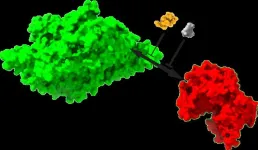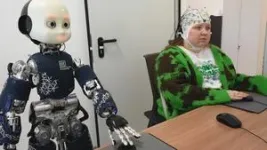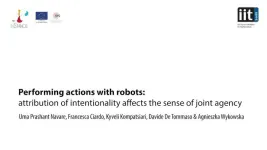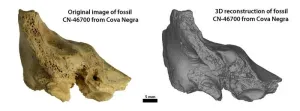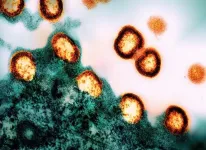(Press-News.org) Whether it’s a first-time visit to a zoo or when we learned to ride a bicycle, we have memories from our childhoods kept well into adult years. But what explains how these memories last nearly an entire lifetime?
A new study in the journal Science Advances, conducted by a team of international researchers, has uncovered a biological explanation for long-term memories. It centers on the discovery of the role of a molecule, KIBRA, that serves as a “glue” to other molecules, thereby solidifying memory formation.
“Previous efforts to understand how molecules store long-term memory focused on the individual actions of single molecules,” explains André Fenton, a professor of neural science at New York University and one of the study’s principal investigators. “Our study shows how they work together to ensure perpetual memory storage.”
“A firmer understanding of how we keep our memories will help guide efforts to illuminate and address memory-related afflictions in the future,” adds Todd Sacktor, a professor at SUNY Downstate Health Sciences University and one of the study’s principal investigators.
It’s been long-established that neurons store information in memory as the pattern of strong synapses and weak synapses, which determines the connectivity and function of neural networks. However, the molecules in synapses are unstable, continually moving around in the neurons, and wearing out and being replaced in hours to days, thereby raising the question: How, then, can memories be stable for years to decades?
In a study using laboratory mice, the scientists focused on the role of KIBRA, or kidney and brain expressed protein, the human genetic variants of which are associated with both good and poor memory. They focused on KIBRA’s interactions with other molecules crucial to memory formation—in this case, protein kinase Mzeta (PKMzeta). This enzyme is the most crucial molecule for strengthening normal mammalian synapses that is known, but it degrades after a few days.
Their experiments reveal that KIBRA is the “missing link” in long-term memories, serving as a “persistent synaptic tag,” or glue, that sticks to strong synapses and to PKMzeta while also avoiding weak synapses.
“During memory formation the synapses involved in the formation are activated—and KIBRA is selectively positioned in these synapses,” explains Sacktor, a professor of physiology, pharmacology, anesthesiology, and neurology at SUNY Downstate. “PKMzeta then attaches to the KIBRA-synaptic-tag and keeps those synapses strong. This allows the synapses to stick to newly made KIBRA, attracting more newly made PKMzeta.”
More specifically, their experiments in the Science Advances paper show that breaking the KIBRA-PKMzeta bond erases old memory. Previous work had shown that randomly increasing PKMzeta in the brain enhances weak or faded memories, which was mysterious because it should have done the opposite by acting at random locations, but the persistent synaptic tagging by KIBRA explains why the additional PKMzeta was memory enhancing, by only acting at the KIBRA tagged sites.
“The persistent synaptic tagging mechanism for the first time explains these results that are clinically relevant to neurological and psychiatric disorders of memory,” observes Fenton, who is also on the faculty at NYU Langone Medical Center’s Neuroscience Institute.
The paper’s authors note that the research affirms a concept introduced in 1984 by Francis Crick. Sacktor and Fenton point out that his proposed hypothesis to explain the brain’s role in memory storage despite constant cellular and molecular changes is a Theseus’s Ship mechanism—borrowed from a philosophical argument stemming from Greek mythology in which new planks replace old ones to maintain Theseus’s Ship for years.
“The persistent synaptic tagging mechanism we found is analogous to how new planks replace old planks to maintain Theseus’s Ship for generations, and allows memories to last for years even as the proteins maintaining the memory are replaced,” says Sacktor. “Francis Crick intuited this Theseus’s Ship mechanism, even predicting the role for a protein kinase. But it took 40 years to discover that the components are KIBRA and PKMzeta and to work out the mechanism of their interaction.”
The study also included researchers from Canada’s McGill University, Germany’s University Hospital of Münster, and University of Texas Medical School at Houston.
This work was supported by grants from the National Institutes of Health (R37 MH057068, R01 MH115304, R01 NS105472, R01 MH132204, R01 NS108190), the Natural Sciences and Engineering Research Council of Canada Discovery (203523), and the Garry and Sarah S. Sklar Fund.
# # #
About New York University
Founded in 1831, NYU is one of the world’s foremost research universities (with more than $1 billion per year in research expenditures, it is ranked seventh among private research universities) and is a member of the selective Association of American Universities. NYU has degree-granting university campuses in New York, Abu Dhabi, and Shanghai; has 13 other global academic sites, including London, Paris, Florence, Tel Aviv, Buenos Aires, and Accra, and US sites in Washington, DC, Los Angeles, CA, and Tulsa, OK; and both sends more students to study abroad and educates more international students than any other U.S. college or university. Through its numerous schools and colleges, NYU is a leader in conducting research and providing education in the arts and sciences, law, medicine, business, dentistry, engineering, education, nursing, the cinematic and performing arts, music and studio arts, public service, social work, public health, and professional studies, among other areas.
About SUNY Downstate Health Sciences University
Downstate Health Sciences University in Brooklyn is one of four academic health centers (AMCs) in the 64-campus State University of New York (SUNY) system and the only SUNY AMC in New York City dedicated to health education, research, and patient care for the borough’s 2.7 million residents. Its flagship hospital, University Hospital at Downstate (UHD), is a teaching hospital that benefits from the expertise of Downstate’s exceptional medical school and world-class research facilities. Beyond its clinical excellence, Downstate houses a range of esteemed educational institutions, including the College of Medicine, College of Nursing, School of Health Professions, School of Graduate Studies, and School of Public Health. Downstate fosters innovation through its multifaceted biotechnology initiatives, including the Biotechnology Incubator and BioBAT, which support both early-stage and more mature biotech companies. Downstate’s research enterprise drives innovation and discovery across a wide array of disciplines. Our investigators are making discoveries that are changing the world and pushing the boundaries of what is possible in biomedicine and healthcare.
END
How do our memories last a lifetime? New study offers a biological explanation
Ground-breaking research uncovers “molecular glue” that helps ensure memory formation and stabilization
2024-06-26
ELSE PRESS RELEASES FROM THIS DATE:
Mechanical computer relies on kirigami cubes, not electronics
2024-06-26
North Carolina State University researchers have developed a kirigami-inspired mechanical computer that uses a complex structure of rigid, interconnected polymer cubes to store, retrieve and erase data without relying on electronic components. The system also includes a reversible feature that allows users to control when data editing is permitted and when data should be locked in place.
Mechanical computers are computers that operate using mechanical components rather than electronic ones. Historically, these mechanical components have been things like levers or gears. However, mechanical computers can also be made using structures that are multistable, meaning ...
Acting for a common goal with humanoid robots
2024-06-26
Genova (Italy), 26 June 2024 – Researchers at the Istituto Italiano di Tecnologia (IIT-Italian Institute of Technology) have demonstrated that under specific conditions, humans can treat robots as co-authors of the results of their actions. The condition that enables this phenomenon is that a robot behaves in a human-like, social manner. Engaging in gaze contact and participating in a common emotional experience, such as watching a movie, are the key. The study was published in Science Robotics and paves the way for understanding and designing the optimal circumstances for humans and robots to collaborate in the same environment.
The ...
Time-compression in electron microscopy
2024-06-26
Scientists at the University of Konstanz in Germany have advanced ultrafast electron microscopy to unprecedented time resolution. Reporting in Science Advances, the research team presents a method for the all-optical control, compression, and characterization of electron pulses within a transmission electron microscope using terahertz light. Additionally, the researchers have discovered substantial anti-correlations in the time domain for two-electron and three-electron states, providing deeper insight into the quantum physics of ...
First case of Down syndrome in Neandertals documented in new study
2024-06-26
BINGHAMTON, N.Y. -- A new study published by an international multidisciplinary team of researchers including faculty at Binghamton University, State University of New York, documents the first case of Down syndrome in Neandertals and reveals that they were capable of providing altruistic care and support for a vulnerable member of their social group.
The research, led by anthropologists at the University of Alcalá and the University of Valencia in Spain, studied the skeletal remains of a Neandertal child, whom they affectionately named “Tina”, found at Cova Negra, a cave in Valencia, Spain long known for yielding important Neandertal discoveries.
“The ...
Future risk of coral bleaching set to intensify globally
2024-06-26
An international team of researchers led by the University of Adelaide has projected future marine heatwaves will cause coral reefs to be at severe risk of bleaching for longer periods than previously seen.
Through climate modelling and supercomputing, the researchers discovered that extended bleaching events may significantly disrupt coral spawning.
“We found that coral bleaching will start earlier in the year and last longer than previously thought,” said lead author Dr Camille Mellin, from the University of Adelaide’s Environment Institute.
“Our results show that by 2080, coral bleaching will tend to start in spring, rather than late summer, which ...
The science of procrastination
2024-06-26
Procrastination, the deliberate but detrimental deferring of tasks, has many forms. Sahiti Chebolu of the Max Planck Institute for Biological Cybernetics uses a precise mathematical framework to understand its different patterns and their underlying reasons. Her insights could help tailor individual strategies to tackle the issue.
“Why did I not do this when I still had the time?” – Whether it is filing taxes, meeting a deadline at work, or cleaning the apartment before a family visit, most of us have already wondered why we tend to put off certain tasks, even in the face of unpleasant consequences. Why do we make decisions that are harmful to us – against our better ...
Saudi women’s quest for change enabled them earn citizenship rights
2024-06-26
Saudi women have obtained their citizenship rights through their own struggle and there is little truth in the widely held idea in the West that their role in the fight for their freedom has been negligible.
The finding is part of a new research in the journal Diogenes authored by Zahia Salhi, a professor at Sharjah University’s College of Arts, Humanities, and Social Sciences. The University of Cambridge Press has also posted Prof. Salhi’s research online.
“Far from being passive victims of their society, Saudi women are active agents ...
Introducing Sir Stanley: Binghamton University professor and Nobel Prize winner knighted by King Charles
2024-06-26
BINGHAMTON, N.Y. -- Binghamton University, State University of New York Distinguished Professor and Nobel Prize Laureate M. Stanley Whittingham has been named a Knight Bachelor “for his services to research in chemistry.”
The honor entitles him to be known as Sir Stanley, or Sir Stanley Whittingham, and was announced as part of King Charles III’s official birthday honours list.
In his 30-plus-year career, Whittingham has been a pioneer in the development of lithium-ion batteries, for which he won the Nobel Prize in Chemistry in 2019. ...
NIH statement on preliminary efficacy results of twice-yearly lenacapavir for HIV prevention in cisgender women
2024-06-26
The injectable antiretroviral drug lenacapavir was safe and 100% effective as long-acting HIV pre-exposure prophylaxis (PrEP) among cisgender women in a Phase 3 clinical trial, according to top-line findings released by Gilead Sciences, Inc., the study sponsor. Lenacapavir is administered every six months, making it the most durable HIV prevention method to have shown efficacy in this population. NIAID applauds the study sponsor, investigators, study staff, and—most importantly—the participants ...
Neurobiologist Joshua C. Brumberg named CUNY Graduate Center president
2024-06-26
The City University of New York has appointed Joshua C. Brumberg as president of the CUNY Graduate Center, making permanent a post he has held on an interim basis since October 2023. Brumberg, a neurobiologist who has been a faculty member, dean and researcher during his 22-year career at CUNY, will lead the University’s renowned center of graduate education, scholarship and public-interest research. CUNY’s Board of Trustees approved the appointment at its meeting last night.
“Dr. Brumberg has played a key role in expanding CUNY’s research enterprise over the past several years,” said Chancellor Félix V. Matos Rodríguez. “A ...
LAST 30 PRESS RELEASES:
Nanoplastics can interact with Salmonella to affect food safety, study shows
Eric Moore, M.D., elected to Mayo Clinic Board of Trustees
NYU named “research powerhouse” in new analysis
New polymer materials may offer breakthrough solution for hard-to-remove PFAS in water
Biochar can either curb or boost greenhouse gas emissions depending on soil conditions, new study finds
Nanobiochar emerges as a next generation solution for cleaner water, healthier soils, and resilient ecosystems
Study finds more parents saying ‘No’ to vitamin K, putting babies’ brains at risk
Scientists develop new gut health measure that tracks disease
Rice gene discovery could cut fertiliser use while protecting yields
Jumping ‘DNA parasites’ linked to early stages of tumour formation
Ultra-sensitive CAR T cells provide potential strategy to treat solid tumors
Early Neanderthal-Human interbreeding was strongly sex biased
North American bird declines are widespread and accelerating in agricultural hotspots
Researchers recommend strategies for improved genetic privacy legislation
How birds achieve sweet success
More sensitive cell therapy may be a HIT against solid cancers
Scientists map how aging reshapes cells across the entire mammalian body
Hotspots of accelerated bird decline linked to agricultural activity
How ancient attraction shaped the human genome
NJIT faculty named Senior Members of the National Academy of Inventors
App aids substance use recovery in vulnerable populations
College students nationwide received lifesaving education on sudden cardiac death
Oak Ridge National Laboratory launches the Next-Generation Data Centers Institute
Improved short-term sea level change predictions with better AI training
UAlbany researchers develop new laser technique to test mRNA-based therapeutics
New water-treatment system removes nitrogen, phosphorus from farm tile drainage
Major Canadian study finds strong link between cannabis, anxiety and depression
New discovery of younger Ediacaran biota
Lymphovenous bypass: Potential surgical treatment for Alzheimer's disease?
When safety starts with a text message
[Press-News.org] How do our memories last a lifetime? New study offers a biological explanationGround-breaking research uncovers “molecular glue” that helps ensure memory formation and stabilization
